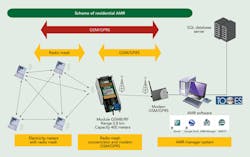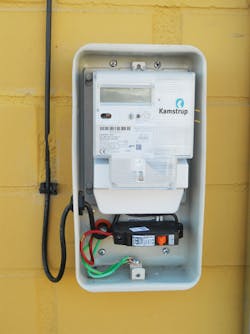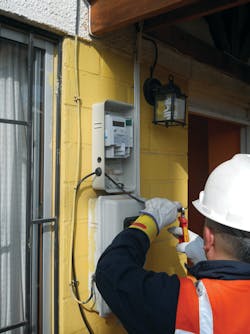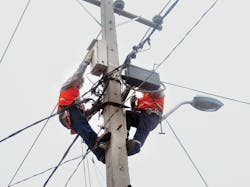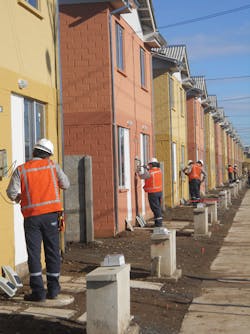In Chile, the implementation of smart grids has been slow, limited to a few isolated pilot projects with narrow coverage. As yet, there are no plans for full-scale development of this latest industry initiative. Against this backdrop, in May 2009, TECNET S.A., a utility of Grupo CGE, the owners of several Chilean utilities supplying some 2 million customers from Arica to Villarrica, decided to investigate this type of technology.
TECNET’s long-term objective was to determine the application of smart grids to assess the value and benefits of this technology for extended application throughout all the utilities in Grupo CGE.
Selection of Equipment
During the pre-tender investigation phase of a pilot project focused on its long-term objective, TECNET established the minimum specifications to be fulfilled by the meters and systems required for the project:
- Documentary evidence that the proposed system was already installed and operating successfully in other utilities around the world
- Ease of installation, operation and maintenance
- Capability of measuring energy bidirectionally and have internal registers for load profiles
- Integrated communication capabilities for remote reading and control
- Facilities to disconnect and reconnect the customer’s energy supply
- Capability to control customer demand
- Multiple-tariff capabilities
- Alarms for events related to supply quality and meter tampering
- Internal meter consumption that does not exceed that of traditional meters (electromechanical)
- Legacy capacity for adding ZigBee, Z-Wave or similar communications
- Ability for supplier to deliver the protocol or software drivers to communicate with the meters
- Reliable, proven and state-of-the-art communications system
- Meet Chilean regulations for commercialization.
TECNET received international interest from 10 companies; investigation of the equipment and systems from these companies took almost two years. Five of the solutions offered were found to fulfill the technical requirements, so economical quotes were requested with the purpose of incorporating the commercial and financial variables into the study.
In March 2011, the technology-based decision-making process was completed, and the utility announced Kamstrup, a Danish company that was not established in Chile, as the solution provider for the initial pilot project.
Pilot Project
In June 2011, CGE Distribución, one of the Grupo utilities, agreed to participate in the pilot project to read remotely the electricity consumption data from 83 houses because of the complexity of traditional reading. The meters were positioned so that they could not be read if the house owner was not present, a situation that was quite common. This caused customer billing problems and increased customer claims, therefore, it was necessary to find a solution before facing allegations from the regulatory authority.
On Sept. 10, 2011, the installation of the first 83 meters using Kamstrup’s automatic meter reading (AMR) solution was started at the Villa Miguel de Cervantes in Buin city, which is supplied by CGE Distribución San Bernardo.
Project Timescale
Following the installation of the first 83 smart meters, the second stage of the pilot project involved the installation of 116 meters in Villa Doña Mabel, located in the city of Rancagua and served by CGE Distribución Rancagua. An important consideration is that in both pilot projects, the new smart meters were installed in parallel with the traditional metering used for invoicing. The purpose for this was to verify, over a three-month period, the quality of the smart meters’ measurement and the reliability and robustness of the communications system. This three-month period also formed the final acceptance test for the selected solution.
The results were excellent, especially the remote metering reading, which recorded a performance of 100% in both of the villas included in the project and confirmed the effectiveness of the radio-mesh communications infrastructure. As a result, by the end of 2012, the utility had more than 1,400 smart meters installed and in service.
Project Benefits
The main benefits experienced in the pilot project sites where the AMR system is in operation include remote meter reading, which takes an average of 10 minutes to read 100 meters. The concept of a closed house, which applied when no one was available to grant access to the meter, ceased to exist. Also, the utility now has the opportunity to disconnect and reconnect the electricity supply remotely, eliminating the possibility of conflict situations involving utility personnel.
The AMR project has improved the control of nontechnical losses. When the smart meter detects an unauthorized interference with the smart meter, a flag is created in the system. On-site verification is performed, and immediate action has been taken in instances of energy theft.
It is now possible to record the power factor for residential customers, which offers the opportunity to impose compensation charges for not fulfilling the approved national regulation (a minimum power factor is 0.93). In the pilot project, 25% of the properties equipped with smart meters failed to comply with the power factor national regulations.
Smart meters offer the possibility of implementing residential tariffs that allow ways to stimulate the use of energy during nonpeak periods. This form of demand-side management would help to improve the load factor of the energy demand curve.
As the smart meters are bidirectional, it provides the utility with net measurement and net billing. Furthermore, there also is the possibility of implementing multi-utility services, as it is now possible to record water and gas meter readings using the smart electricity meter as the concentrator.
Despite all of these benefits, it is still difficult to produce a favorable cost-benefit analysis to justify the capital investment required for full-scale implementation of smart meters throughout the country.
Additional Applications
Since the pilot project, the utility now has an improved understanding and knowledge of the system as a result of installing smart meters. It has been possible to solve other problems, of a relatively minor nature, as a result of using remote meter reading. For example, the electricity consumption for telecom antennas, normally located in high positions and often difficult to access, can now be read using smart meters. Also, a challenge for the utility in the past has been to agree to satisfactory terms for regular meter readings with the telecom companies, a problem that was resolved with the smart meters.
The utility also has started to use the built-in facilities in the smart meter on public lighting supply points to program and limit power consumption.
Future Challenges
The technical advantages of smart meter technologies have been tested to the satisfaction of TECNET and the CGE utilities, mainly CGE Distribución. The higher cost of implementation compared to traditional metering requires government intervention and support by adapting the current legislation. Subsidies or the creation of tariff schemes are two ways that could be employed to motivate the implementation of these technologies on a full scale. This would result in improved energy management and, hence, alleviate the pressure of interest groups with respect to the country’s energy policies.
The most encouraging action taken so far was Law N° 20.571, adopted in February 2012, which regulates the payment of energy tariffs for the residential producer. This law is a step forward, but it took legislators more than three years to make it law.
In August 2011, TECNET organized a Smart Grids and Remote Meter Reading for the Residential Sector seminar, where, among others, the regulatory authorities were shown the utility’s experiences in this field and exposed to the need for more government support on these issues.
A practical issue of no small relevance is that, in Chile, legislation allows the customer to have ownership of the electricity meter. This makes it difficult to change old meters for smart ones, as it is common for residential customers to refuse the meter exchange by issuing a claim to the regulatory authority. In these situations, the regulation authority normally rules in favor of the customer by not allowing the meter replacement.
The question of meter ownership in Chile differs from many other countries where regulations state that the utility provides and recertifies the customer metering equipment at regular intervals. Such a regulation in Chile would simplify the implementation of smart metering solutions.
TECNET is now working on moving from AMR to advanced metering infrastructure (AMI), with the clear intention of moving forward to offer a smart grid solution in Chile. Finally, the possibility of reducing the cost of smart metering, to which suppliers must also contribute, is an important challenge that, if overcome, would also help to propel the full implementation of smart grids.
Eduardo Mora ([email protected]) is an electrical engineer with 18 years of experience in subtransmission and distribution systems. He is responsible for the operation, maintenance, connection, certification, testing and calibration of electricity meters and measurement systems in the sectors of generation, subtransmission and distribution, also with important bounds to the processes of quality management systems for ISO9001 and ISO 17025.
Companies mentioned:
Grupo CGE| www.cge.cl
Kamstrup| http://kamstrup.com
TECNET| www.tecnet.cl
Sidebar: TECNET S.A.
TECNET S.A. is a branch company of Grupo CGE with more than 1000 employees and 40 offices throughout the country. Its main business interests include generation, metering, emergency attention services, electrical infrastructures and work on energized lines. The utility’s research and development division is managing its smart grid networks.
In addition to TECNET, Grupo CGE owns several electric utilities in Chile — EMEL norte, EMELAT, CONAFE, CGE Distribución and EMELECTRIC — reaching more than 2 million customers from Arica to Villarrica.

